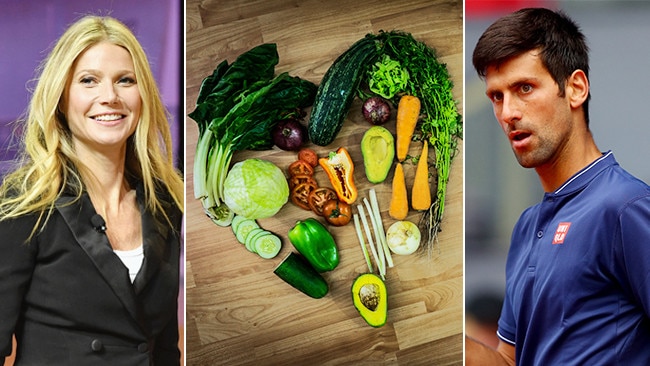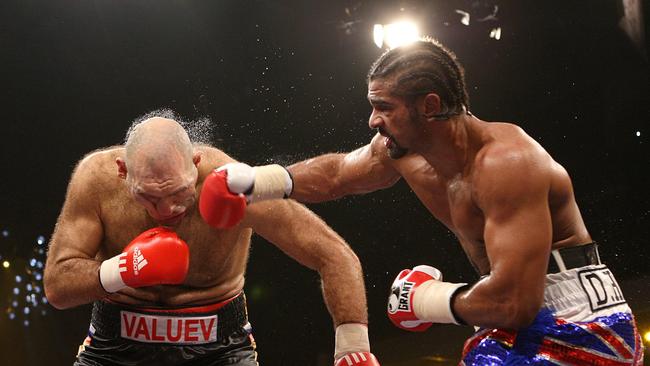Fad or future? How we reached peak vegan
From kings of sports to queens of Hollywood and social media, everyone is into veganism. Are they really serious?

Once upon a not very tasty time, when a walnut roast was the most inedible invention in the history of food, vegans were regarded as complete nuts. Then veganism became a thing, with cookbooks and pretty bloggers and celebrities and added facon. And now vegans aren’t just a thing, they are ... everywhere.
I thought we had reached peak vegan last week when Forest Green Rovers, owned by the multimillionaire environmentalist Dale Vince, were promoted to the Football League, becoming the first football club in the upper echelons of the game where fans won’t be able to buy a meat pie before the match. The sale of animal products is banned at the ground.
But, no, that was not peak vegan: for there is a new summit looming on the animal-free horizon. Next month comes the publication of 5:2 Veggie and Vegan. That’s right, there is now no need to be either a devotee of the 5:2 diet or a vegan. You can be both!
That, anyway, is the view of the book’s author. Kate Harrison argues that veganism can be just as unhealthy as any other diet if you go about it the wrong way. “A vegan diet and a healthy diet often go together but they don’t always go together,” she says. “So you could be looking to control your weight if you are vegan, it is not automatic that you are going to be skinny and a bit pale which is the perception that people have got of vegans.
“Intermittent fasting has health benefits that we are learning more and more about and so does a diet that is reliant on plants.”
The fusion of 5:2 and veganism may just be the making of a 2017 summer supertrend, but I for one will make sure I visit its devotees on the days when they are not abstaining from cooking Harrison’s fresh corn and black bean tacos or super savoury miso aubergine. Both look pretty good.
Thirty years ago vegetarians were thought to be a bit cranky — the most famous veggie restaurant even called itself Cranks. Ten years ago vegans were regarded as weirdos. However, in the past decade the number of vegans in Britain has grown from 150,000 to more than half a million, a trend driven by young people. Four out of ten vegans are aged 15-34.
Many young people, especially the thousands of teenagers who are vegans, may find their way to veganism through food bloggers such as Ella Mills (Deliciously Ella), who is vegetarian (but not vegan). But Harrison, who has no time for the “manic hypochondria of extreme eating” some bloggers push, says there are a range of reasons that people are vegans and if she asked 100 vegans and vegetarians about their diet you would get 100 different answers.
Good health is near the top of most people’s list of reasons followed by animal welfare concerns, the effect of animal husbandry on the environment, the financial cost of eating meat and even the taste.
“Eat food, not too much, mostly plants,” Michael Pollan, the American writer, famously commanded a few years ago. Today plants are icons, superfoods such as avocado, roast cauliflower and kale that promise a longer, healthier life. The hope of extending their earthly existence has motivated some of the most unlikely people to become vegans.
Bill Clinton, who as president used to inhale hamburgers, was named person of the year by Peta (People for the Ethical Treatment of Animals) after he adopted a largely (but not exclusively) vegan diet. Gwyneth Paltrow, Ellen DeGeneres and Pamela Anderson are less surprising celebrity vegans, but one of the biggest boosts for veganism in recent years may have been the emergence of elite sportsmen who have converted to veganism.

The heavyweight boxer David Haye was named sexiest vegan of the year in 2014. Jermain Defoe credited his recall to the England squad in March in part to chilling in a cryotherapy chamber and “trying to turn vegan”, by cutting out the grilled salmon, eggs, dairy and even honey that he used to eat. Former bodybuilder Patrik Baboumian, also known as Popeye, is Germany’s strongest man and holds a world log lift record. He has followed a strict vegan diet for the past six years. The tennis player Novak Djokovic has opened a vegan cafe in Monte Carlo, where he lives, although he has admitted to still occasionally eating fish.
Continuing to eat the odd portion of oily fish does not quite fit with the traditional view of vegans as austere food purists. This, however, is the reality of diets today. We are all (or a lot of us anyway) a little bit veggie. “Many meat eaters avoid eating meat all the time. Vegetarians go to veganism by trying it a couple days a week,” says Harrison, who has been vegetarian for 30 years and eats a vegan diet some days each week. She’s not a full-time vegan because “I love cheese and butter too much” but she started fasting two days a week five years ago to lose weight.
In our hearts we know that the western diet is bad for us and that stripping rainforest to grow food to feed animals for us to eat is an environmental disaster. And so we find a niche for ourselves on the vegetarian spectrum.

At one end of the scale is Ingrid Newkirk, the founder of Peta, who told me last year that she wouldn’t squish a mosquito on the wall of her apartment. There are others who follow VB6, the Vegan Before 6pm regimen, dreamt up the American food writer Mark Bittman. This involves veganism during the day and a vampire-like conversion to eating what you like in the evening. This was designed for those who can’t stick to diets and lose their willpower after an evening drink anyway.
Then there are people such as Richard Dawkins, who in The Times last week compared the transportation of cows to the railway wagons that took Nazi victims to Auschwitz and said that he is vegetarian at home but is a “flexitarian” who doesn’t make a fuss when invited to dinner and presented with flesh. Farther along the scale are lightweights, like me, who eat meat but will always choose the vegetarian option when possible in the canteen, unless it looks disgusting.
Flexitarians are ubiquitous. More than half the customers who go to Pret a Manger’s Veggie Pret stores are trying to cut down on the amount of meat they eat. Porridge made with coconut milk accounts for one in five of the chain’s porridge sales.
Eric Lindstrom, the author of The Skeptical Vegan, which is being published in the UK this summer, is an American author who says that anyone can become a vegan. Almost six years ago he was overweight and appalled with himself at eating 68 chicken wings as an appetiser. He and his wife bet each other they couldn’t become vegan. “We started with a 30-day vegan challenge and after 30 days both of us had made it. You feel better when you eat vegetables and fruits. Six years later I refuse to lose this bet.”
Lindstrom did it for the health benefits and lost 30lb. Later he became converted to the idea that it was important to be vegan for animal welfare and environmental reasons. Now he is a passionate vegangelist. “Years from now you can look back and say, ‘I’ve saved thousands of animals and I lost 30lb and I feel great and I’ve got fantastic erections’, which is a huge benefit literally of veganism.”
Forget what I said about peak veganism earlier. “It’s all blood flow, everything is blood flow,” says Lindstrom, who lives in New York state. He gives a long explanation of the apparently superior blood flow enjoyed by vegans. He also dispels the “protein myth. You can get as much protein as you need from broccoli.”
Lindstrom warns that you have to go about veganism carefully, making sure you get enough B12 and other micronutrients and phytonutrients. He insists, however, that contrary to some research that warns of the dangers of children following a poorly supervised vegan diet, it is perfectly possible for them to be vegan. In fact, his kids are.
“I have a four-year-old boy who can lift a Volkswagen over his head,” he says. “He’s the healthiest kid in his class.” His two-year-old daughter, who is also vegan, “totally understands we don’t eat animals”.
The one thing that you won’t be short of if you do decide to take the vegan plunge is information. My colleagues on the food pages at The Times sit behind walls of cookery books and they estimate that a quarter of them are about vegetarianism, veganism or healthy eating.
And they are popular. Ella Mills’s first book is claimed to be the UK’s biggest-selling debut cookbook, shifting more than 300,000 copies since its publication in January 2015. Today the Hairy Bikers, the British television chefs whom I last interviewed when they produced a lip-smacking book on meat feasts, are publishing The Hairy Dieters Go Veggie. Yesterday, on pre-orders alone, it was in the Top 5 on Amazon’s bestsellers. Other, pure vegan cookbooks include Hippie Lane, by the Australian Taline Gabrielian, who has half a million followers on Instagram, and Vegan: The Cookbook — a serious doorstopper.
We may have reached peak vegan, but only for now. The global appetite for meat may be growing, but in the UK veganism appears to be far more than a fad. “Will we get to a place where this planet is vegan?” muses Lindstrom. “I don’t think so. Could we start a new planet that is vegan? That would be great.”
The Times


